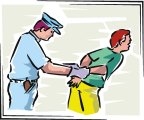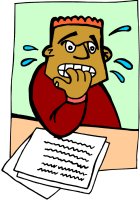
Worksheets and No Prep Teaching Resources
Reading Comprehension Worksheets
Crime and Terrorism

Crime and Terrorism
 Worksheets and No Prep Teaching Resources Reading Comprehension Worksheets Crime and Terrorism |
 Crime and Terrorism |
| edHelper's suggested reading level: | grade 6 | |
| Flesch-Kincaid grade level: | 8.17 |
|
Anxiety
By Jennifer Kenny |

|
 1 Have you ever felt uneasy and fearful? Of course you have. We all have. Perhaps you had to give a report to your class and were scared. Maybe you were afraid of the dark when you were younger. Maybe you were worried about a big test. It's perfectly normal to be apprehensive about different things at certain points in your life.
1 Have you ever felt uneasy and fearful? Of course you have. We all have. Perhaps you had to give a report to your class and were scared. Maybe you were afraid of the dark when you were younger. Maybe you were worried about a big test. It's perfectly normal to be apprehensive about different things at certain points in your life. |
Create Weekly Reading Books
Prepare for an entire week at once! |
| Leave your feedback on Anxiety (use this link if you found an error in the story) |
 |
Crime and Terrorism
|
 |
Social Studies
|